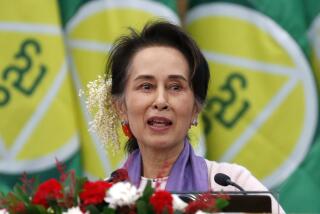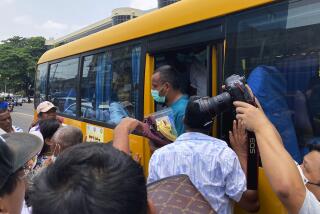Celebrating Birth of A Nation
SEOUL — South Korea celebrated the 50th anniversary of its birth as a republic on Saturday by releasing 2,174 prisoners, including more than 100 political prisoners.
Those freed were among 7,007 prisoners granted amnesty by President Kim Dae Jung on Friday to mark the day that is also the 53rd anniversary of the peninsula’s liberation from Japanese rule.
Prison officers said the 2,174 prisoners were released on parole at 10 a.m. Saturday. The rest either had their civil rights restored or sentences reduced.
The Justice Ministry freed 103 prisoners of conscience after they signed an oath to obey the law as a condition of their release. Protesters around the country urged the government to release hundreds more dissidents.
An estimated 400 other political prisoners refused to sign the oath and remained in prison. They included 17 who have served 30 years or more behind bars, often in solitary confinement.
Prominent political prisoners freed include dissident poet Park No-Hae, 41, who had been labeled by South Korean human rights groups as the nation’s most symbolic prisoner of conscience.
Kim also used the occasion to extend a hand of friendship to communist North Korea, offering to send a special envoy to Pyongyang to discuss a new vehicle for inter-Korean dialogue.
The president said the amnesty aimed to “create harmony among the Korean people to overcome a national crisis.”
Financial turmoil in South Korea has sent unemployment and bankruptcy to record levels, with the economy expected to shrink 5% this year.
Kim on Saturday proposed a new deal for the country’s growing ranks of unemployed, guaranteeing they would receive minimum requirements for food, clothing, medical care and school tuition.
*
On Saturday, tens of thousands of police were deployed throughout Seoul to block leftist students from marching to the border village of Panmunjom to attend a North Korean rally.
Some 2,500 radical students had gathered at Seoul National University before making the journey.
Meanwhile, Japan’s new Prime Minister Keizo Obuchi marked the 53rd anniversary of the end of World War II on Saturday, expressing “deep remorse” for the victims of Japanese militarism.
Obuchi broke no new ground at the Japanese government’s memorial ceremony for the war dead as he delivered a speech that was almost identical to the one made by his predecessor, Ryutaro Hashimoto, at last year’s anniversary.
“The war caused pain and suffering to the people in Japan and many Asian countries,” Obuchi said. “I solemnly accept this fact and would like to offer heartfelt condolences with deep remorse.”
Obuchi, formerly a foreign minister in Hashimoto’s Cabinet, followed the same line of “deep remorse” for Asian victims of Japanese militarism that has been repeated by his predecessors at this ceremony for six years.
More to Read
Sign up for Essential California
The most important California stories and recommendations in your inbox every morning.
You may occasionally receive promotional content from the Los Angeles Times.









